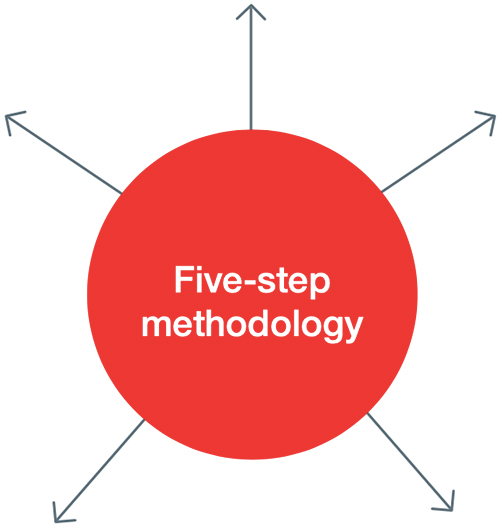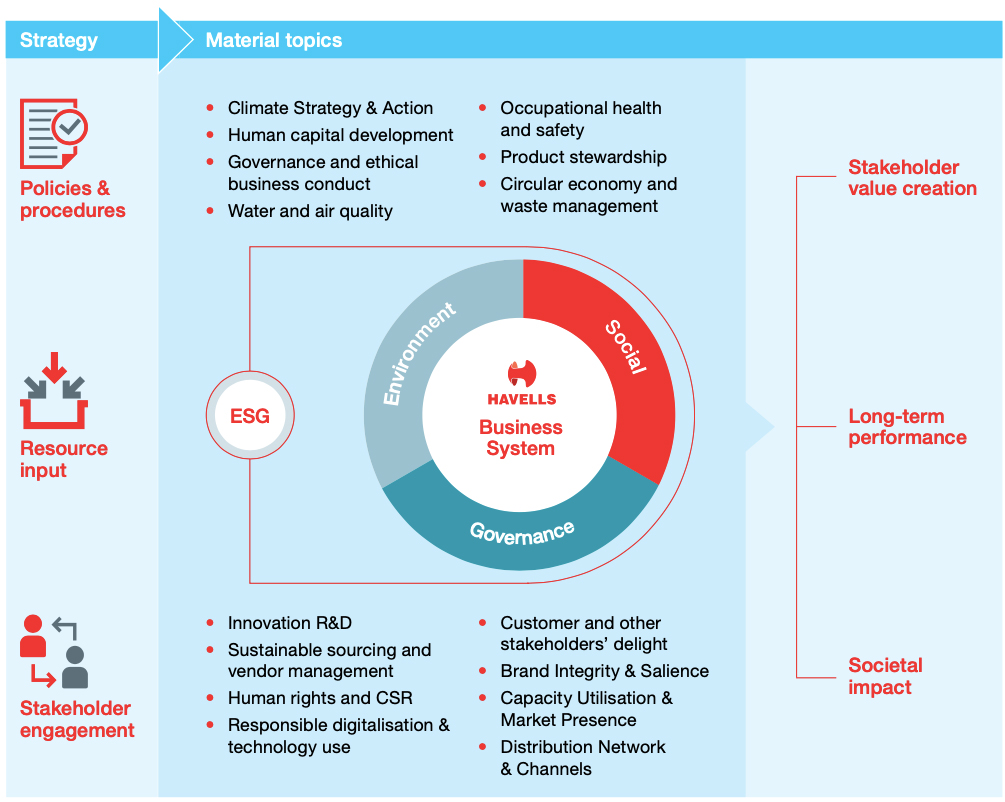Material topics
We conducted a materiality assessment exercise to identify the topics most critical to value creation while better understanding our obligations towards our stakeholders.
ESG materiality assessment process FY 2021-22
A universe of material topics was shortlisted, each of which were assigned a framework score, industry score, survey score, risk score and management score. The frameworks considered included Business Responsibility and Sustainability Report (BRSR), Global Reporting Initiative (GRI), Sustainability Accounting Standards Board (SASB), Dow Jones Sustainability Indices (DJSI), Morgan Stanley Capital International (MSCI) & Sustainalytics. To arrive at the industry score, international and Indian companies in the electrical equipment and appliances space were considered. An ESG materiality survey was rolled out to 100+ participants, including the management and senior leadership team.

Rank
- Issues were ranked according to importance based on management and employee surveys
- 100+ responses received from participants
Identify
- Used ESG frameworks and standards, ESG ratings, and peer benchmarking to recognise potentially relevant issues
Strategise
- Incorporate these factors on the broader business strategy
- Communicate the new strategy to all relevant stakeholders
Score
- Fresh ranking of issues based on the weighted average score achieved by each issue
- Separate score assigned to each material issue based on the response
Manage
- Recognise significant environmental, social and governance risks and opportunities for Havells
- Determine areas for target setting to improve business and sustainability performance
Material topics
EClimate Strategy & Action
SHuman capital development
GGovernance and ethical business conduct
EWater and air quality
SOccupational health and safety
EProduct stewardship
ECircular economy and waste management
GInnovation R&D
GCapacity Utilisation & Market Presence
GDistribution Network & Channels

GSustainable sourcing and vendor management
SHuman rights and CSR
SResponsible digitalisation & technology use
GCustomer and other stakeholders’ delight
GBrand Integrity & Salience
EEnvironment
SSocial
GGovernance
Environment

Climate strategy and action
Low carbon footprint and carbon intensity of our products in manufacturing and usage. Resilience for Climate Change impacts on our business activities and supply chain


Water and air quality
Water is a key resource for the society and judicious use of water is a key priority to us. Maintaining Air quality in and around our premises is a top commitment for us



Product stewardship
Ensure high quality, product safety, durability, repairability and serviceability as well as responsible use of resources throughout the life cycle of the product


Circular economy and waste management
Responsible end of life disposal of our product and services by following ‘5Rs’ – reduce, reuse, recycle, recover and residual management; strive for zero waste to landfill
Social


Human capital developmentn
Focus on Employee Engagement, Learning & Development, Diversity & Inclusion, Fair treatment, leadership & succession planning etc.


Responsible digitalisation and technology use
Managing IT risks and including contingency plans are crucial to ensuring business continuity, along with protecting personal data integrity

Occupational health and safety
Ensuring safe, sound and healthy working environment for all employees.







Human rights and CSR
Contributing to the upliftment of the society and upholding human rights as per the UN Declaration of Human Rights
Governance


Governance and ethical business conduct
The balance of pursuing economic interests while maintaining accountability and ethical integrity

Distribution network and channels
Diversifying distribution channels to reach all our customers and consumers

Brand integrity and salience
How consumers and markets perceive our Company and its products, image, and reputation including degree of recall of our brand across different product lines

Capacity utilisation and market presence
Capacity utilisation is associated with the amount that a plant can generate to the plant’s actual output. It has a direct correlation to demand and market presence

Innovation and R&D
Innovation is the key to stay current and relevant to our customers and for delivering sustained responsible growth




Sustainable sourcing and vendor management
Sustainable procurement, supply chain resilience, local vendor management





Customer and other stakeholders’ delight
Our Stakeholders form the core of our value creation. We believe in creating value and equitable wealth for our stakeholders through our business process
Sustainability model
Our sustainability model focuses on stakeholder value creation through identification of the Havells’ material topics, developed in consultation with the stakeholders. The strong foundation of governance with ethics, integrity, transparency help us steer our way forward.

Sustainability model
Our sustainability model factors in stakeholder expectations and strategic business objectives. We have arrived at the model through detailed consultation on our material topics with our diverse stakeholder base. The model rests on the strong foundation of corporate governance that is based on ethics, integrity and transparency.
Focus on compliance
We have strong compliance systems in place to ensure that we comply with relevant statutory regulations. We keep a constant check against discrimination, child labour or forced labour.
During the year, no material fines or non-monetary sanctions were levied on the Company for non-compliance with environmental laws and regulations. There were no incidents of non-compliance or fines levied with respect to the regulations or voluntary codes relating to the health and safety impacts of Havells’ products and services, products-related communication and product information disclosure and labelling.